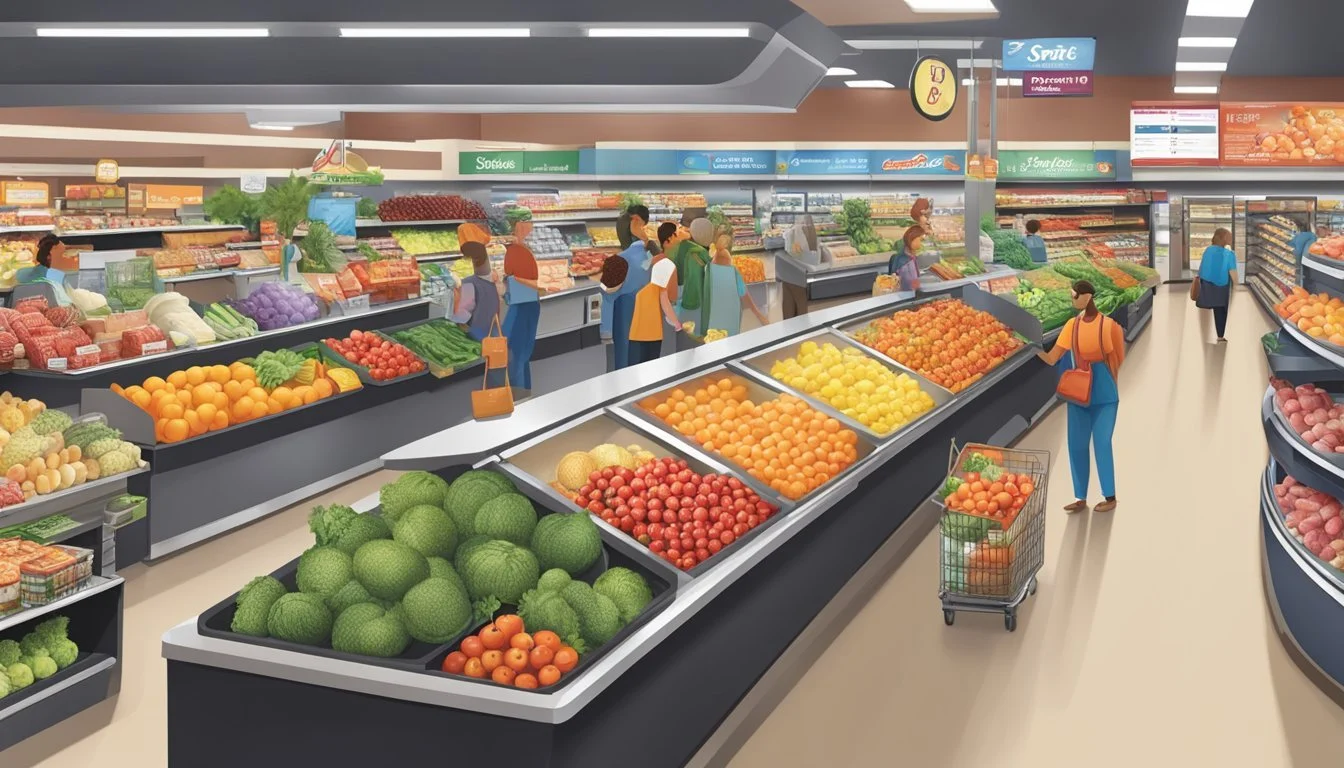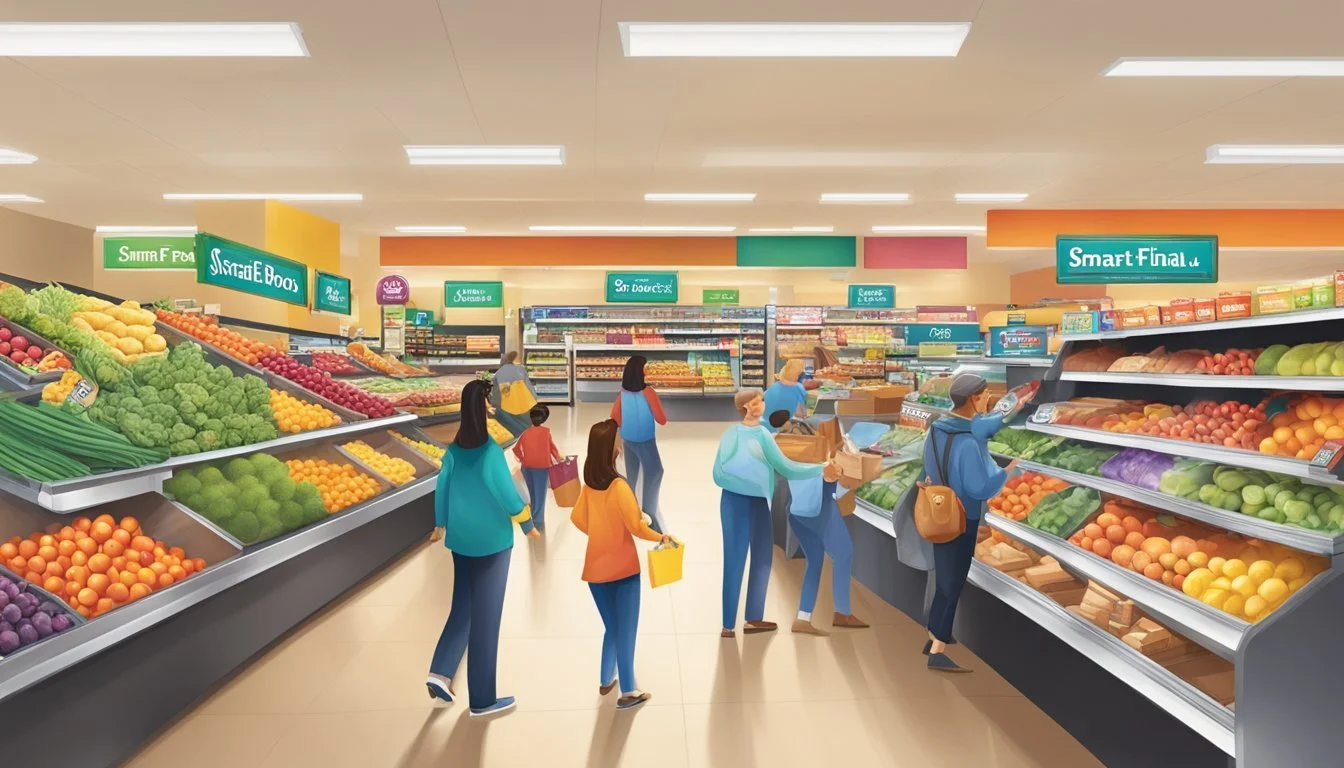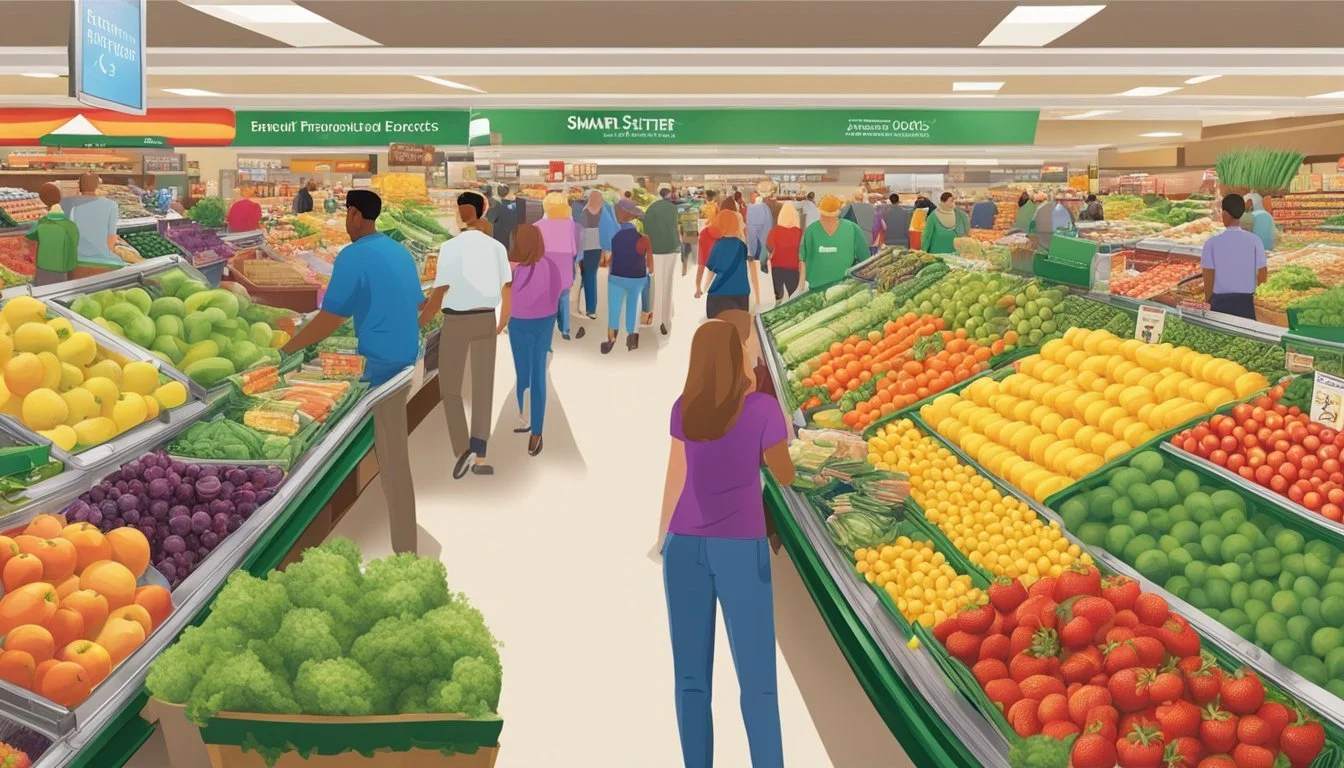Smart & Final vs Stater Bros. Markets
A Comprehensive Comparison of Prices, Selection, and Service
Smart & Final and Stater Bros. Markets are two popular grocery chains in California, each offering unique shopping experiences for customers. While both stores aim to provide quality products at competitive prices, they cater to slightly different market segments.
Smart & Final focuses on a warehouse-style format, offering bulk items and catering to both households and businesses. The store's prices are generally 14% lower than the average grocery store, making it an attractive option for budget-conscious shoppers. Smart & Final's combination of low prices and bulk offerings makes it particularly appealing for large families, small businesses, and organizations looking to save money on groceries and supplies.
Stater Bros. Markets, on the other hand, is a traditional supermarket chain known for its emphasis on customer service and fresh produce. The store has built a reputation for its meat department, although recent concerns have been raised about the quality of some products. Stater Bros. tends to have slightly higher prices compared to discount chains but often compensates with a wider selection of brand-name items and a more conventional shopping experience.
Company Overview
Smart & Final and Stater Bros. Markets are two prominent grocery chains serving customers in the western United States. Both companies have deep roots in California and have evolved to meet changing consumer needs over the decades.
History and Evolution
Smart & Final traces its origins to 1871 when Hellman-Haas Grocery was founded in Los Angeles. The company went through several mergers and name changes before becoming Smart & Final in 1914. It has since grown into a warehouse-style food and supply store chain.
Stater Bros. Markets began in 1936 when twin brothers Cleo and Leo Stater purchased their first store in Yucaipa, California. With a modest $600 down payment, they laid the foundation for what would become a successful regional supermarket chain.
Both companies have adapted to market changes and expanded their operations over time. Smart & Final has diversified its product offerings, while Stater Bros. has maintained a focus on traditional grocery items.
Business Model and Operations
Smart & Final operates as a warehouse-style retailer, offering bulk products and supplies to both household and business customers. The company's stores typically feature a mix of grocery items, fresh produce, and foodservice supplies.
Stater Bros. Markets follows a more traditional supermarket model, focusing on providing a wide range of groceries, fresh produce, meats, and household items to individual consumers and families.
Both chains prioritize competitive pricing strategies to attract customers. Smart & Final leverages its bulk-buying model to offer lower prices, while Stater Bros. emphasizes everyday low prices and weekly specials.
Market Presence
Smart & Final has expanded beyond its California roots, operating over 250 stores across the western United States. The company also has a presence in northwestern Mexico.
Stater Bros. Markets maintains a stronger regional focus, with its operations concentrated in southern California. The chain has grown to become a significant player in the area's grocery market.
Both companies face competition from larger national chains and discount retailers. However, they have carved out loyal customer bases through their unique offerings and community involvement.
Smart & Final and Stater Bros. Markets continue to adapt to changing consumer preferences and market conditions, striving to maintain their positions in the competitive grocery industry.
Product and Service Comparison
Smart & Final and Stater Bros. Markets offer distinct product selections and services. Both stores aim to meet diverse customer needs, but their offerings differ in key areas like produce quality, meat options, and specialty items.
Quality of Produce
Smart & Final provides a wide range of fresh produce, often in bulk quantities. Their fruits and vegetables are generally good quality and priced competitively. Stater Bros. Markets, on the other hand, is known for its emphasis on locally sourced produce. They often feature seasonal fruits and vegetables from California farms.
Both stores maintain clean and well-organized produce sections. Smart & Final tends to have a larger variety of pre-packaged produce items, which can be convenient for customers buying in larger quantities. Stater Bros. typically offers a more diverse selection of loose produce, allowing customers to pick individual items.
Meat Selection
Stater Bros. Markets takes pride in its meat department. They offer a wide variety of fresh cuts, including beef, pork, poultry, and seafood. Their butchers provide custom cuts upon request. Smart & Final's meat selection is more limited but includes both fresh and frozen options.
Stater Bros. often features locally sourced meats and specialty items like marinated cuts. Smart & Final focuses on bulk packaging, making it a popular choice for large families or small businesses. Both stores offer competitive prices on their meat products.
Dairy and Bakery Offerings
Smart & Final provides a good selection of dairy products, including milk, cheese, and eggs, often in larger quantities. Their bakery section typically offers pre-packaged items and some fresh-baked goods. Stater Bros. Markets usually has a more extensive in-store bakery, producing fresh bread, cakes, and pastries daily.
Stater Bros. often features a wider variety of specialty cheeses and local dairy products. Both stores stock common dairy alternatives like soy and almond milk. Smart & Final's dairy section caters more to bulk buyers, while Stater Bros. focuses on variety and freshness.
Frozen Food Variety
Smart & Final excels in frozen food options, offering a wide range of items in bulk packaging. Their selection includes frozen vegetables, fruits, meats, and prepared meals. Stater Bros. Markets provides a more standard frozen food section, with a focus on popular brands and family-sized portions.
Smart & Final's frozen section often includes restaurant-quality items, making it popular among small business owners. Stater Bros. typically offers a good balance of name-brand and store-brand frozen products, catering to everyday family needs.
Organic and Free-Range Options
Stater Bros. Markets has been expanding its organic and free-range offerings in recent years. They now feature dedicated sections for organic produce, meats, and dairy products. Smart & Final's organic selection is more limited but includes some popular organic staples.
Both stores offer free-range eggs and poultry options. Stater Bros. typically provides a wider variety of organic produce, while Smart & Final may have more bulk organic dry goods. Neither store specializes in organic products, but both are increasing their selections to meet growing customer demand.
Additional Services
Smart & Final caters to both household and business customers. They offer services like bulk ordering and delivery options, which can be beneficial for small restaurants or event planners. Stater Bros. Markets focuses more on individual consumers and families, providing services like custom cake ordering and pharmacy services in some locations.
Stater Bros. often features local community involvement programs and supports regional charities. Smart & Final's business-oriented approach includes services like online ordering and curbside pickup. Both stores offer loyalty programs, but Stater Bros. tends to have more weekly specials and personalized discounts.
Price and Value for Money
Smart & Final and Stater Bros. Markets offer distinct pricing strategies and value propositions for shoppers. Each store provides opportunities for savings through various methods, appealing to different customer needs and preferences.
Everyday Prices
Smart & Final focuses on bulk purchases and competitive pricing on everyday items. Their larger package sizes often translate to lower per-unit costs. Stater Bros. Markets, on the other hand, maintains competitive prices on a wide range of standard grocery items. They frequently offer deals on fresh produce and meats, making them attractive for regular household shopping.
Discounts and Savings Programs
Smart & Final provides a Business Rewards program for frequent shoppers, offering cash back on qualifying purchases. They also feature weekly specials and digital coupons. Stater Bros. Markets runs a robust weekly ad program with discounts on various products. Their digital coupons and loyalty program allow customers to save on regular purchases and earn points for future savings.
Comparative Cost Analysis
When comparing specific items, prices can vary significantly between the two stores. For example, a dozen large eggs might cost $2.49 at one store and $3.99 at the other. Smart & Final often comes out cheaper on bulk items and cleaning supplies. Stater Bros. Markets typically offers better prices on fresh produce and meat. A family spending $250 per week on groceries could potentially save 14-29% by choosing the store with lower prices for their specific shopping list.
Table: Price Comparison Example
Item Smart & Final Stater Bros. Markets Eggs (1 dozen) $2.49 $3.99 Chicken (5 lbs) $9.99 $12.99 Milk (1 gallon) $3.29 $3.49
These prices are illustrative and may vary based on location and promotions.
Customer Experience
Smart & Final and Stater Bros. Markets offer distinct customer experiences. The two chains differ in their approach to in-store service, convenience, and online shopping options.
In-Store Service
Smart & Final emphasizes efficiency with its warehouse-style layout. Employees are generally helpful but fewer in number compared to traditional supermarkets. The store caters to both individual shoppers and small businesses, which can lead to varied wait times at checkout.
Stater Bros. Markets takes pride in personalized service. Their stores typically have more staff available to assist customers. Employees are often knowledgeable about product locations and can offer recommendations. The chain focuses on creating a welcoming, community-oriented atmosphere.
Both stores maintain clean environments, but Stater Bros. tends to have a more traditional grocery store feel.
Convenience and Accessibility
Smart & Final stores are often located in urban areas, making them accessible to city dwellers and businesses. Their larger pack sizes benefit customers buying in bulk. Store hours vary by location, with some open late to accommodate diverse schedules.
Stater Bros. Markets are primarily found in suburban areas. They offer a wider selection of conventional grocery items, catering to families doing weekly shopping. Most locations have standardized hours, typically closing earlier than Smart & Final.
Both chains provide ample parking, though Smart & Final's lots may be smaller due to urban locations.
Online Shopping and Delivery Services
Smart & Final has embraced e-commerce, offering online ordering and delivery through third-party services in many areas. Their website and mobile app allow customers to browse products, create shopping lists, and schedule pickups or deliveries.
Stater Bros. Markets has been slower to adopt online shopping options. While they've recently expanded their e-commerce presence, services are not as widespread as Smart & Final's. Some locations offer curbside pickup, but delivery options are limited.
Both stores continue to improve their digital platforms, recognizing the growing demand for convenient shopping alternatives.
Corporate Responsibility and Ethical Practices
Smart & Final and Stater Bros. Markets both emphasize corporate responsibility and ethical practices. Their initiatives focus on environmental sustainability, community support, and responsible sourcing policies.
Environmental Initiatives
Smart & Final has implemented energy-efficient lighting and refrigeration systems in its stores. The company uses recycled materials for packaging and encourages customers to bring reusable bags.
Stater Bros. Markets has invested in solar panels for some locations, reducing their carbon footprint. They've also launched a comprehensive recycling program for cardboard, plastic, and food waste.
Both chains have worked to minimize food waste through partnerships with local food banks and composting programs.
Community Engagement
Smart & Final supports local schools through its First Street First Percent program, donating a portion of profits from its private label brand. The company also organizes regular food drives and volunteer events.
Stater Bros. Markets focuses on supporting military families and veterans. They host an annual fundraising campaign for local charities and offer scholarships to employees' children.
Both grocers provide disaster relief aid during emergencies in their operating areas.
Sourcing Policies
Smart & Final prioritizes locally-sourced produce and partners with regional farmers. They've committed to cage-free eggs and have expanded their organic offerings.
Stater Bros. Markets emphasizes hormone-free meat and dairy products. The chain has increased its selection of plant-based alternatives to cater to changing consumer preferences.
Both companies have implemented stricter auditing processes for suppliers to ensure food safety and ethical labor practices. They've also expanded their fair trade product lines, particularly in coffee and chocolate categories.
Brand Loyalty and Customer Demographics
Smart & Final and Stater Bros. Markets attract distinct customer bases with tailored loyalty programs. Each chain focuses on specific demographics and employs strategies to foster long-term customer relationships.
Core Demographics
Smart & Final primarily caters to small businesses, foodservice operators, and budget-conscious families. The store's bulk offerings and competitive pricing appeal to those seeking value. Stater Bros. Markets, in contrast, targets middle-class families and individuals in suburban areas.
Stater Bros. emphasizes fresh produce and high-quality meats, attracting health-conscious shoppers. Smart & Final's customer base includes a higher percentage of Hispanic shoppers, reflecting its locations in diverse neighborhoods.
Engagement and Retention Strategies
Smart & Final's loyalty program, Smart Rewards, offers personalized discounts and digital coupons. The program integrates with their mobile app, allowing customers to track rewards and access exclusive offers.
Stater Bros. focuses on community involvement and local partnerships to build brand loyalty. Their "Harvesting Hope" program supports local food banks, resonating with socially conscious consumers.
Both chains use targeted promotions and weekly circulars to drive repeat visits. Smart & Final emphasizes bulk purchases and business-oriented deals, while Stater Bros. highlights fresh produce specials and family-sized offerings.
Social media engagement differs between the chains. Smart & Final actively promotes its business solutions, while Stater Bros. shares recipes and meal planning tips to connect with families.
Competitive Landscape
The grocery market features numerous competitors vying for consumer dollars. Smart & Final and Stater Bros. Markets face competition from large national chains, regional players, and specialty grocers.
Alternatives to Smart & Final and Stater Bros.
Shoppers have many options beyond Smart & Final and Stater Bros. Markets. Walmart and Target offer groceries alongside general merchandise. Kroger and Albertsons operate large supermarket chains nationwide. Safeway provides another full-service grocery option in many areas.
Whole Foods and Sprouts Farmers Market cater to health-conscious consumers. Trader Joe's offers unique private-label products. Grocery Outlet appeals to bargain hunters with discounted items. Amazon has entered the grocery space through its acquisition of Whole Foods and Amazon Fresh stores.
Regional chains like Publix in the Southeast and Lucky in Northern California provide strong local competition. Foods Co serves as another low-price option in some markets.
Major Competitors' Strengths and Weaknesses
Walmart leverages its massive scale to offer low prices but may lack the selection of traditional grocers. Kroger boasts a wide network of stores and strong private-label offerings. Albertsons provides a full-service shopping experience but faces challenges integrating its various banners.
Whole Foods excels in organic and natural products but carries a premium price tag. Trader Joe's cultivates a devoted following with unique items but has a limited selection. Target attracts shoppers with its "Tar-zhay" cachet and store designs.
Safeway delivers a reliable shopping experience across many markets. Publix earns high marks for customer service in its operating area. Sprouts appeals to health-focused consumers with its produce and bulk offerings.
[Do not include a conclusion or summary.]
Summary and Final Recommendations
Smart & Final and Stater Bros. Markets each have unique strengths as grocery retailers. Smart & Final offers bulk purchasing options and caters to both households and businesses. Their prices tend to be competitive, especially for larger quantities.
Stater Bros. Markets focuses more on traditional grocery items and fresh produce. They emphasize customer service and maintain a strong local presence in Southern California communities.
For shoppers seeking bulk purchases or business supplies, Smart & Final is the better choice. Their warehouse-style stores provide a wide range of products in larger sizes at reasonable prices.
Those prioritizing a traditional grocery experience with high-quality produce should consider Stater Bros. Markets. Their stores typically offer a more familiar layout and shopping environment.
Price-conscious consumers may find better deals at Smart & Final, particularly on non-perishable goods and cleaning supplies. Stater Bros. often competes well on fresh food prices.
Ultimately, the best choice depends on individual shopping needs and preferences. Many customers may benefit from shopping at both stores, taking advantage of each retailer's unique offerings and promotions.







